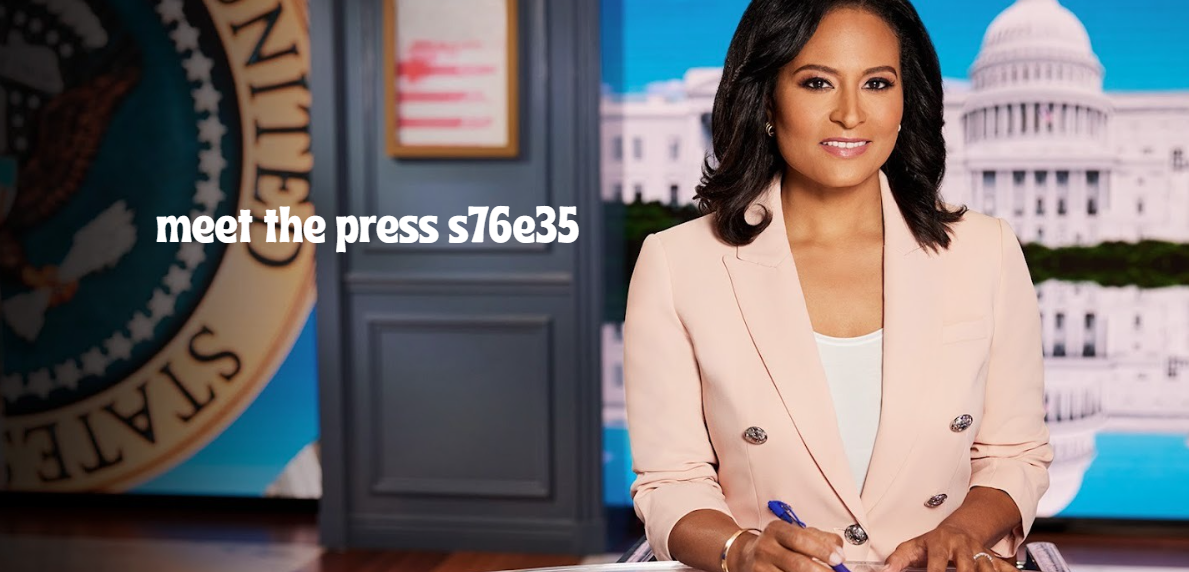Meet the Press S76E35: An In-Depth Analysis of the Episode’s Key Themes and Insights
In an era where political discourse and timely information shape public opinion, Meet the Press has long stood as a beacon of journalistic integrity and insight.
The episode titled “Meet the Press S76E35” dives deep into the pressing issues of our time, offering viewers a robust analysis of current events, notably focusing on Hurricane Helene’s impact across the South and former President Donald Trump’s critiques of the White House’s response while campaigning.
This article will explore the nuances of the episode, including its key themes, expert insights, and broader implications for American politics and society.
ALSO READ: Niles Garden Circus: A Spectacular Fusion of Nature and Entertainment
Understanding the Context: Hurricane Helene’s Devastation
Hurricane Helene recently left a trail of destruction across the Southern United States, prompting urgent conversations about disaster management and governmental accountability. The Meet the Press S76E35 episode meticulously dissects the storm’s aftermath and the political ramifications of the government’s response.
The Scale of the Destruction
The destruction caused by Hurricane Helene was significant, affecting thousands of homes, displacing families, and leading to loss of life. Communities were left grappling with the immediate aftermath and the long-term recovery process. The episode does well to highlight:
- Affected Areas: Major cities and rural areas alike faced severe flooding and infrastructure damage. Places like Louisiana and Mississippi were particularly hard-hit, prompting state and federal emergency responses.
- Government Response: The episode questions the adequacy and speed of the response from federal, state, and local authorities. Analysts weigh in on how these responses align with past hurricane management practices.
- Media Coverage: The media’s role in providing timely updates and holding authorities accountable is emphasized. How information is disseminated during crises can significantly affect public perception and action.
Trump’s Critique of the White House Response
A key component of Meet the Press S76E35 is the discussion surrounding former President Trump’s criticisms of the current administration’s handling of Hurricane Helene. While many expect political figures to capitalize on disasters for electoral gain, Trump’s approach is notable for its specificity and timing.
Trump’s Political Strategy
Trump’s remarks were not merely critiques; they served as a strategic play on the political chessboard:
- Rallying Support: By criticizing the White House, Trump positions himself as an alternative leader who promises a more effective response to crises. This could resonate with voters dissatisfied with the current administration’s handling of natural disasters.
- Engagement on the Campaign Trail: His comments were made during campaign appearances, linking his political ambitions with a call for improved governance. The timing suggests that he aims to reignite his base by invoking their concerns about government efficiency.
Expert Analysis of Trump’s Remarks
Political analysts featured in Meet the Press S76E35 provide context to Trump’s criticisms:
- Divisive Rhetoric: Some argue that Trump’s approach may further divide the nation, especially when discussing the recovery of communities in need. Analysts warn of the risks associated with politicizing disasters.
- Potential Impact on Voter Sentiment: Polling data presented during the episode indicates that perceptions of the government’s response to natural disasters can significantly sway voter opinions, particularly in regions affected by such crises.

Broader Implications for Disaster Management and Policy
The discussions in Meet the Press S76E35 extend beyond immediate political maneuvering to address broader implications for disaster management and policy-making in the USA. The episode effectively ties in historical context, providing a well-rounded view of how governments have responded to crises over the decades.
Historical Context of Disaster Responses
Understanding the historical context of disaster responses helps frame current discussions:
- Katrina’s Legacy: The failure of the government during Hurricane Katrina remains a reference point for evaluating current disaster management strategies. Experts discuss the lessons learned and the progress made since then.
- Federal vs. Local Responsibilities: The episode raises critical questions about the division of responsibilities between federal and local governments in disaster management. Who should bear the burden of recovery efforts?
ALSO READ: Niles Garden Circus: A Spectacular Fusion of Nature and Entertainment
The Role of Technology in Disaster Response
Technology plays an increasingly vital role in managing natural disasters:
- Forecasting and Early Warning Systems: Advances in meteorological technology allow for better forecasting and early warnings, potentially saving lives and minimizing damage.
- Social Media and Communication: Social media platforms have become essential for disseminating information quickly. However, the reliance on social media also presents challenges regarding misinformation and public panic.

ALSO READ: Niles Garden Circus: A Spectacular Fusion of Nature and Entertainment
The Future of Political Discourse in Disaster Management
The dynamics explored in Meet the Press S76E35 highlight the shifting landscape of political discourse in the face of disasters. As politicians like Trump leverage crises for political gain, it raises ethical questions about the responsibilities of leaders during emergencies.
Shaping Public Perception
Public perception is shaped significantly by how leaders communicate during disasters:
- Empathy vs. Criticism: The balance between expressing empathy for victims and critiquing government responses can be delicate. Effective leaders must navigate this terrain carefully to maintain public trust.
- Media Responsibility: Media outlets are tasked with reporting facts while also contextualizing political comments within the broader framework of governance and accountability.
Insights from the Episode: Key Takeaways
Meet the Press S76E35 offers several key takeaways for viewers:
- Accountability Matters: The need for transparency and accountability in disaster responses is paramount. Both citizens and politicians must prioritize effective governance.
- Political Strategy and Ethics: The ethical implications of leveraging disasters for political gain must be scrutinized. Voters should be aware of how their leaders are framing issues.
- Engagement and Recovery: Community engagement is critical in recovery efforts. Leaders must foster dialogue and collaboration among various stakeholders, including government agencies, NGOs, and the affected populations.
- Long-Term Planning: Preparing for future disasters requires long-term planning and investment in infrastructure, technology, and community resilience. The episode advocates for proactive measures rather than reactive responses.
FAQs About Meet the Press S76E35
1. What topics were covered in Meet the Press S76E35?
The episode primarily focused on Hurricane Helene’s devastation across the South and former President Trump’s criticism of the White House’s response during his campaign appearances.
2. Who were the guests on Meet the Press S76E35?
The episode featured political analysts, experts in disaster management, and other relevant figures who provided insights into the political and social implications of the hurricane and the governmental response.
3. How did Trump’s comments impact the political landscape?
Trump’s comments were strategically timed to bolster his campaign efforts, positioning himself as a leader who can provide better disaster management than the current administration. This has potential implications for voter sentiment, especially in affected regions.
4. What are the implications for disaster management in the USA?
The episode highlights the importance of accountability, the role of technology, and the need for long-term planning to enhance disaster response strategies in the future.
5. How does media coverage influence public perception during disasters?
Media coverage plays a crucial role in shaping public perception, as it informs citizens about the situation and holds leaders accountable. However, the potential for misinformation on social media presents challenges that need to be addressed.
Conclusion: The Enduring Relevance of Meet the Press
Meet the Press S76E35 is more than just an episode discussing the immediate aftermath of a hurricane; it serves as a microcosm of the broader conversations about governance, responsibility, and political strategy.
The insights provided not only deepen our understanding of current events but also challenge viewers to think critically about the role of leadership and media in shaping public discourse.
As political landscapes continue to evolve and natural disasters remain an ever-present threat, programs like Meet the Press play an essential role in informing the public and fostering critical discussions that influence the future of American society.
ALSO READ: Niles Garden Circus: A Spectacular Fusion of Nature and Entertainment






